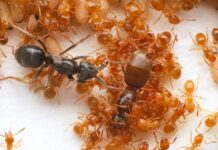For generations, coffee farmers have battled an unseen force: the natural cycle of boom and bust in their harvests. This phenomenon, called “alternate bearing,” causes plants to produce abundant yields one year, followed by a dramatic drop the next. New research from Northeastern University reveals that this biological rhythm isn’t just an agricultural challenge—it fundamentally shapes how farmers approach their livelihoods, and where public policy needs to intervene.
The Biological Reality of Alternate Bearing
Coffee plants, like many fruit-bearing species, don’t maintain consistent production. After a year of heavy fruiting, they deplete their energy reserves, taking a full season to recover before yielding again. This isn’t a sign of poor management—it’s inherent to the plant’s biology. Yet, this fundamental truth often goes unrecognized, leading farmers to misattribute low yields to external factors like pests or rainfall, rather than the plant’s natural cycle.
Why This Matters: Beyond the Farm
The implications extend far beyond individual harvests. Smallholder farmers, who rely heavily on coffee for their income, are particularly vulnerable to unpredictable yields. The cycle creates economic instability, forcing them to make difficult choices about resource allocation and long-term planning. Furthermore, the assumption that low yields are always due to external failures can lead to ineffective policy interventions.
Farmers’ Strategies: Bridging Biology and Practice
Researchers Gabriela Garcia and Laura Kuhl found that farmers’ approaches to alternate bearing are deeply tied to their understanding of its causes. Those who believe low yields stem from external factors focus on irrigation, pest control, and other conventional methods. However, farmers who recognize the plant’s inherent cycle prioritize resource management, like fertilizer application, to mitigate the lows.
The Policy Gap: Filling the Support System
The research suggests a critical policy gap: a lack of institutional support for farmers when synchronized low yields occur. When entire fields produce poorly at the same time, it compounds economic hardship and increases vulnerability to external shocks. The study calls for integrated approaches that acknowledge both the biological realities and the social implications of alternate bearing.
A New Framework: Resilience Through Understanding
The key takeaway is that resilience in coffee farming requires a nuanced understanding of the interplay between ecological dynamics and farmer perceptions. By recognizing the plant’s inherent variability, policymakers can design more effective support systems and promote sustainable practices. This includes providing financial safety nets during low-yield years, promoting diverse planting strategies to average out harvests, and investing in research that bridges the gap between biology and agricultural decision-making.
Ultimately, the cycle of alternate bearing isn’t a problem to be solved, but a reality to be managed. By acknowledging its influence, farmers and policymakers can work together to build a more resilient and sustainable coffee industry


























